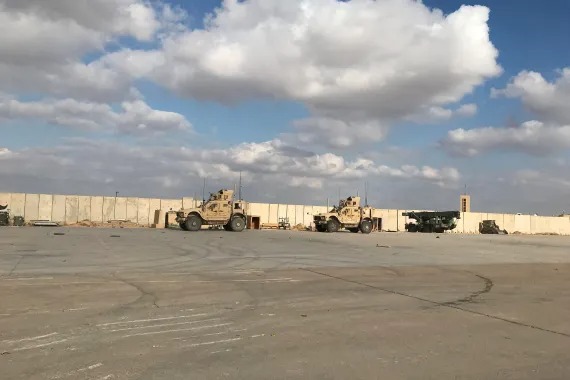In a stark rebuke of the United States, the Iraqi government has condemned a series of air raids targeting Iran-backed fighters, labeling the strikes as a blatant violation of Iraqi sovereignty. The strikes, which resulted in the death of eight pro-Iran militia members, have heightened tensions between the two nations and raised concerns about the region’s stability.
Unilateral Strikes Spark Diplomatic Fury
The government spokesman, Bassem al-Awadi, expressed Iraq’s displeasure, emphasizing that the US had not coordinated these attacks with Iraqi authorities. Al-Awadi described the airstrikes as an “unacceptable violation of Iraqi sovereignty,” adding fuel to the already simmering diplomatic discord. The lack of communication and collaboration between the two nations has fueled concerns about the potential ramifications of such unilateral actions on regional stability.
Pro-Iran Militia Vows Retaliation
Confirming the casualties, the pro-Iran militia Kataib Hezbollah, also known as Hezbollah Brigades, issued a stern warning, asserting that the attacks “will not go unpunished.” This ominous declaration has raised fears of retaliatory actions, further escalating tensions in the already volatile region. The ominous cloud of potential reprisals hangs heavy as both nations navigate the aftermath of the deadly airstrikes.
US Cites Retaliation for Attacks on Coalition Forces
The US Central Command defended its actions, stating that the strikes were a direct response to “attacks against US and coalition forces by Iran and Iran-backed groups.” This retaliatory stance, linked to recent hostilities stemming from the ongoing Gaza war, underscores the complex web of geopolitical dynamics at play in the Middle East. The airstrikes represent the first publicly acknowledged US offensive against Iran-backed forces in Iraq, reflecting a strategic shift in response to escalating provocations.
The situation becomes more intricate as the US finds itself under fire not only in Iraq but also in neighboring Syria, where its positions have been targeted by Iran-backed groups. The tit-for-tat attacks and counterattacks in the region have created a precarious environment, adding uncertainty to an already tense geopolitical landscape.
Escalation of Attacks and Iraqi Condemnation
The recent airstrikes mark a concerning milestone in the conflict, as the frequency of attacks against US positions has surged since the eruption of the Gaza war on October 7. The Pentagon reports at least 66 attacks, causing injuries to more than 60 personnel deployed in Iraq and Syria. The escalating violence prompted the US retaliation, culminating in the latest strikes that drew a sharp rebuke from the Iraqi government.
Government spokesman al-Awadi, while denouncing the Iran-backed groups for their alleged involvement in attacks against US forces, labeled their actions as “unlawful” and accused them of “jeopardizing the national interest.” As the rhetoric intensifies and accusations fly, the precarious situation raises concerns about the potential for a further deterioration of diplomatic relations between Iraq and the United States.
In the midst of this tense standoff, the Ain al-Assad airbase in Anbar province, hosting US-led coalition forces, has become a focal point. With roughly 2,500 US soldiers in Iraq and 900 in Syria, deployed to prevent the resurgence of ISIL, the region is now a powder keg of geopolitical tensions, awaiting the next move in this high-stakes diplomatic chess game.
















